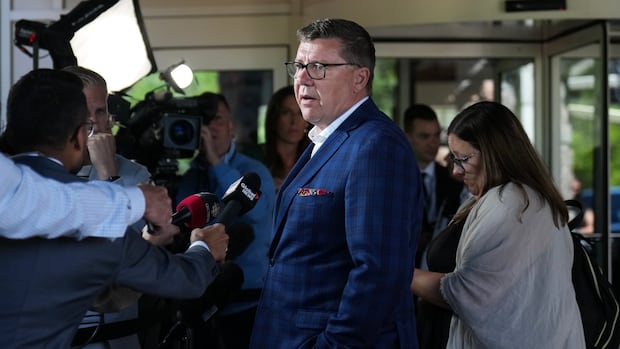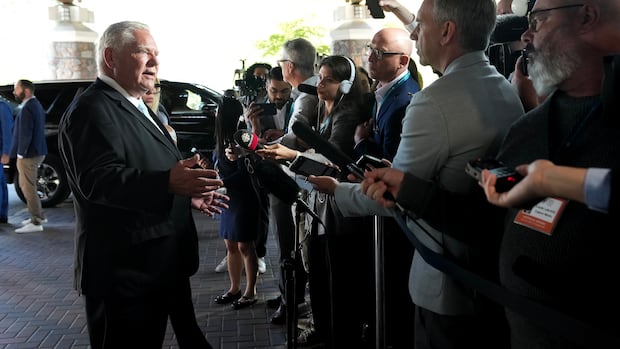[
Canada’s premiers arrived in Ontario cottage country on Monday eager to discuss Canada’s ongoing trade crisis with the United States and settle into a plan for how they can work together with Indigenous leaders to strengthen the country’s economy.
On his way into the summit, Saskatchewan Premier Scott Moe said it’s becoming obvious Prime Minister Mark Carney’s warning that it’s unlikely Canada can strike an entirely tariff-free deal with the U.S. is simply “the reality of the situation.”
“Exceptions, carve outs, exclusions, exemptions — whatever you might call them, that is the reality: that we won’t get to zero on each and every topic,” he said.
“The goal is to get as close to zero, on as many items that we possibly can. I know that’s the prime minister’s goal as well.”
Quebec Premier François Legault said that while it may be too early to accept that dour news, any deal needs to provide enough certainty to encourage businesses to invest.
“The ideal situation would be no tariffs. But if there are some, we need to have some assurance that we will keep this agreement for three, five years,” he said. “We need to have an economy where companies know what’s happening in six months, in 12 months from now.”
Ontario Premier Doug Ford is hosting the 13 premiers in Huntsville, Ont., about 220 kilometres north of Toronto, for a three-day summit focused on the tariffs and trade disruption that have come to define Canada’s economic relationship with the U.S.
They started the summit on Monday with Indigenous leaders. In the afternoon, they’re expected to sign more memorandums of understanding intended to remove barriers to interprovincial trade.
N.L. Premier John Hogan’s arrival is delayed because of out-of-control wildfires threatening the town of Musgrave Harbour on Newfoundland’s northeast coast.
On Tuesday, Carney will provide the premiers an update on trade negotiations. The prime minister announced his attendance shortly after U.S. President Donald Trump threatened a 35 per cent tariff on Canadian goods that are not compliant with the existing Canada-U.S.-Mexico Agreement, known as CUSMA.
Ontario Premier Doug Ford says Canada ‘could be an economic powerhouse’ by unleashing the country’s energy and resources. He spoke at the start of a three-day summit with premiers.
Ford was unwilling accept that tariffs were an inevitability before the premiers hear from Carney.
“What I’m glad [about] is the country is united. We may differ on a few views here and there, but we walk out of here united as a county, as a strong, sovereign country.”
Ford said if tariffs do remain, Canada needs to start “onshoring everything” by doing things like halting the import of steel for construction and making aluminum cans in Canada instead of exporting raw materials to the U.S. and then importing the finished cans back to Canada.
He said the best response is to “start buying Canadian-made everything. That will hurt them more than anything.”
Moe agreed, saying finding new markets and breaking down provincial trade barriers is a better way to respond than using counter-tariffs, which he said are hurting his province.
Breaking down barriers
Since the trade war with the U.S. began, the provinces have begun signing memorandums signalling their intentions to amend their rules and regulations as part of the largest push in modern history to liberalize interprovincial trade.
One study estimates that internal trade hurdles cost the Canadian economy about $200 billion annually, and all provinces have expressed a willingness to work on this issue as a means of countering Trump’s tariffs.
Moe described those efforts so far as “positive” and that he was hoping to see discussions around moving forward with “a more expansive agreement” on internal trade.
The premiers are also expected to discuss how to build major projects following the passage of the federal government’s Bill C-5, which seeks to fast-track projects of national importance.
Alberta Premier Danielle Smith said she was looking forward to talking to Carney about C-5.
The law allows cabinet to quickly grant federal approvals for projects such as mines, ports and pipelines by sidestepping existing laws and streamlining the environmental assessment process.
“The problem is historically that [big projects] haven’t moved at all,” Smith said. “Projects have 10-year or more time horizons and I think in this new world that we are in we have to figure out a way to get to yes faster.”
“I’m supportive of an abridged timeframe but I think we have to figure out how that is going to work to make sure that Indigenous communities feel respected.”
The premiers are also expected to discuss Arctic security, wildfires and emergency management, labour mobility, immigration, health and public safety.

